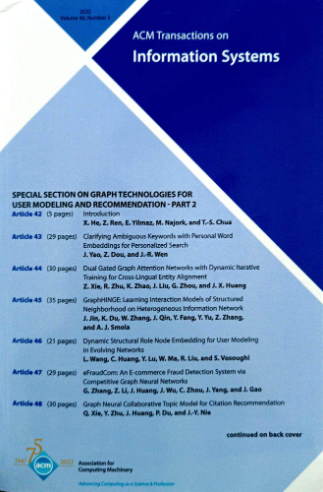SetRank:推荐系统协同排名的一种Setwise贝叶斯方法
IF 9.1
2区 计算机科学
Q1 COMPUTER SCIENCE, INFORMATION SYSTEMS
引用次数: 0
摘要
推荐系统的最新发展侧重于协作排名,它为用户提供排序列表而不是评级预测。排序后的物品列表可以更直接地反映用户的偏好,在实践中通常比评级预测效果更好。虽然在这方面已经作出了相当大的努力,但众所周知的成对和列表方法仍然受到各种挑战的限制。具体而言,对于两两方法,在实践中并不总是坚持独立的两两偏好假设。此外,由于整个列表排列的先决条件,列表方法不能有效地容纳“关系”和未观察到的数据。为此,在本文中,我们提出了一种新的setwise贝叶斯协同排名方法,即SetRank,以内在地适应推荐系统中用户反馈的特征。SetRank的目的是最大化新的集合偏好结构的后验概率,并提出了三种SetRank的实现方法。我们还从理论上证明了SetRank的超额风险界可以与\(\sqrt {M/N}\)成正比,其中M和N分别为商品数量和用户数量。最后,在四个真实数据集上进行的大量实验清楚地验证了SetRank与各种最先进基线相比的优越性。本文章由计算机程序翻译,如有差异,请以英文原文为准。
SetRank: A Setwise Bayesian Approach for Collaborative Ranking in Recommender System
The recent development of recommender systems has a focus on collaborative ranking, which provides users with a sorted list rather than rating prediction. The sorted item lists can more directly reflect the preferences for users and usually perform better than rating prediction in practice. While considerable efforts have been made in this direction, the well-known pairwise and listwise approaches have still been limited by various challenges. Specifically, for the pairwise approaches, the assumption of independent pairwise preference is not always held in practice. Also, the listwise approaches cannot efficiently accommodate “ties” and unobserved data due to the precondition of the entire list permutation. To this end, in this article, we propose a novel setwise Bayesian approach for collaborative ranking, namely, SetRank, to inherently accommodate the characteristics of user feedback in recommender systems. SetRank aims to maximize the posterior probability of novel setwise preference structures and three implementations for SetRank are presented. We also theoretically prove that the bound of excess risk in SetRank can be proportional to \(\sqrt {M/N}\) , where M and N are the numbers of items and users, respectively. Finally, extensive experiments on four real-world datasets clearly validate the superiority of SetRank compared with various state-of-the-art baselines.
求助全文
通过发布文献求助,成功后即可免费获取论文全文。
去求助
来源期刊

ACM Transactions on Information Systems
工程技术-计算机:信息系统
CiteScore
9.40
自引率
14.30%
发文量
165
审稿时长
>12 weeks
期刊介绍:
The ACM Transactions on Information Systems (TOIS) publishes papers on information retrieval (such as search engines, recommender systems) that contain:
new principled information retrieval models or algorithms with sound empirical validation;
observational, experimental and/or theoretical studies yielding new insights into information retrieval or information seeking;
accounts of applications of existing information retrieval techniques that shed light on the strengths and weaknesses of the techniques;
formalization of new information retrieval or information seeking tasks and of methods for evaluating the performance on those tasks;
development of content (text, image, speech, video, etc) analysis methods to support information retrieval and information seeking;
development of computational models of user information preferences and interaction behaviors;
creation and analysis of evaluation methodologies for information retrieval and information seeking; or
surveys of existing work that propose a significant synthesis.
The information retrieval scope of ACM Transactions on Information Systems (TOIS) appeals to industry practitioners for its wealth of creative ideas, and to academic researchers for its descriptions of their colleagues'' work.
 求助内容:
求助内容: 应助结果提醒方式:
应助结果提醒方式:


